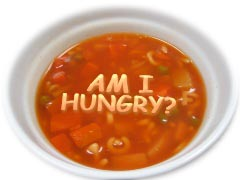 One of the most common questions I’m asked is, “What is mindful eating? ” Quite simply, it is eating with intention and attention or purpose and awareness. The next and even more important question is, “How does mindful eating help?”
One of the most common questions I’m asked is, “What is mindful eating? ” Quite simply, it is eating with intention and attention or purpose and awareness. The next and even more important question is, “How does mindful eating help?”
A recent study described in this article on NPR, “Hours After a Meal, It’s the Memory that Matters“, provides one reason why mindful eating makes a difference. In the study by Jeffrey Brunstrom, “Episodic Memory and Appetite Regulation in Humans,” researchers showed people a picture of a small bowl or a large bowl of soup before eating, then fed them either a small bowl or a large bowl of soup–but the participants didn’t know which. Those who ate the large bowl felt more full right afterward, but those who saw a picture of a large bowl were less hungry a few hours later than those who saw a smaller bowl, regardless of how much they actually ate at the meal.
In other words, the visual memory of a meal plays an important role in satiety hours after a meal. This is consistent with our experience in teaching mindful eating to tens of thousands of people: eating mindfully increases satiety even hours after a meal.
So what does that mean for you? Well, eating while you’re distracted prevents you from forming a visual memory of your meal so you may want to eat again sooner than if you had paid attention to your food. Mindful eating teaches us to focus on eating and minimize distractions like watching TV, driving, reading, or using the computer.
Action Plan: Set your intention to make eating a multisensory experience to form a strong memory of your meal. You’ll likely find that you are more satisfied with less food!

6 thoughts on “Eating mindfully increases satiety hours after a meal”
When people talk about eating while standing up and preparing food, licking the spoon, etc. they jokingly say “Those calories don’t count.” What this article says is that it truly does not count as eating in your brain. Your brain is not satisfied by the nibbles along the way to dinner or the snack of nuts you pop in your mouth as you travel by the kitchen counter or out the door. Now whenever I want to eat standing up at the counter, I think “this is not going to count,” but in a different way. It motivates me to put whatever I am nibbling in a ramekin, and to sit down and relish what I am eating. A new twist to an old joke that had more truth than they knew!
Susan, this is BRILLIANT! You are exactly right.
Love that perspective Susan!
Comments are closed.